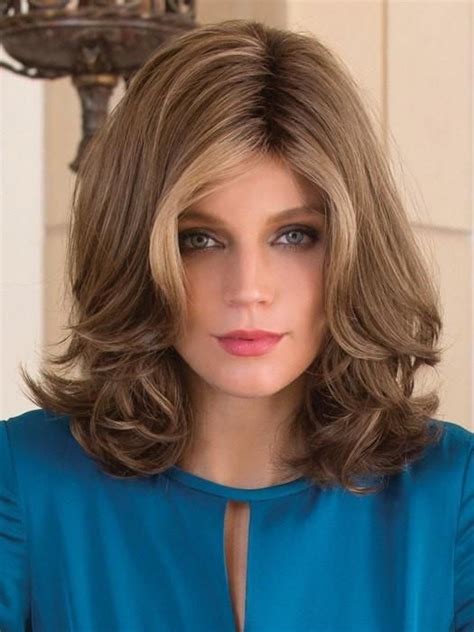Embark on a Synthetic Wig Wonderland!
Synthetic wigs have revolutionized the world of hair, offering countless options for those seeking instant transformations, voluminous locks, or a touch of glamour. With their affordable prices and low-maintenance nature, it’s no wonder why these wigs are taking the beauty industry by storm.

Types of Synthetic Wigs
1. Traditional Synthetic Wigs
These wigs are made from heat-resistant fibers that can withstand heat styling up to 250-300 degrees Fahrenheit. They come in a wide range of colors, styles, and lengths.
2. Lace Front Wigs
Lace front wigs are constructed with a lace base along the hairline, creating a more natural-looking appearance. They allow for a seamless transition between the wig and your own hair.
3. Mono Wigs
Mono wigs are made with a monofilament top that gives the illusion of hair growing directly from the scalp. They provide a breathable and comfortable fit.
4. Human Hair Blend Wigs
These wigs combine human hair and synthetic fibers, offering a natural look while remaining affordable.
Benefits of Synthetic Wigs
1. Affordability: Synthetic wigs are significantly cheaper than human hair wigs, making them an excellent option for those on a budget.
2. Low Maintenance: Unlike human hair wigs, synthetic wigs require minimal maintenance. They can be washed and air-dried, saving you time and hassle.
3. Durability: Synthetic wigs are more durable than human hair wigs and can withstand heat styling and wear and tear.
4. Variety of Styles: Synthetic wigs come in countless colors, styles, and lengths, providing endless opportunities for experimentation.
Matters to Consider
1. Quality: Choose high-quality synthetic fibers that will last longer and maintain their shape after washing.
2. Cap Construction: Consider the type of cap construction that suits your needs. Lace front wigs offer a natural hairline, while monofilament wigs provide breathability.
3. Color and Style: Select a wig that complements your skin tone and personal style. Remember, you can always customize the wig by cutting or styling it to your liking.
Common Mistakes to Avoid
1. Over-Styling: Avoid over-styling synthetic wigs with heat, as it can damage the fibers. Use low heat settings and apply a heat protectant spray before styling.
2. Incorrect Washing: Never use regular shampoo or conditioner on synthetic wigs. Use a specially formulated wig shampoo and conditioner to prevent damage.
3. Tangling: Avoid brushing synthetic wigs when dry. Use a wide-tooth comb or a detangling spray to remove tangles gently.
Tips and Tricks
1. Store Properly: Store synthetic wigs on a wig stand or in a breathable bag to prevent tangling and maintain their shape.
2. Freshen Up: To freshen up a synthetic wig between washes, use a dry shampoo or a wig refresher spray.
3. Color Customization: If you want to customize the color of your synthetic wig, consider using temporary hair dye or hair chalk.
Innovation in Synthetic Wigs
Wiggly-Wags: These innovative synthetic wigs incorporate motion sensors that allow them to move and dance with the wearer, creating a playful and interactive experience.
Informative Tables
Table 1: Types of Synthetic Wig Caps
| Cap Type | Features |
|---|---|
| Capless | No cap construction, providing a breathable fit |
| Traditional | Made with a solid material, offering durability |
| Lace Front | Features a lace base along the hairline, creating a natural look |
| Mono | Constructed with a monofilament top, giving the illusion of natural hair growth |
Table 2: Synthetic Wig Fiber Types
| Fiber Type | Characteristics |
|---|---|
| Kanekalon | Shiny and heat-resistant up to 250-300 degrees Fahrenheit |
| Toyokalon | Softer and more natural-looking than Kanekalon |
| Modacrylic | Lightweight and heat-resistant up to 350 degrees Fahrenheit |
| Polyester | Durable and colorfast |
Table 3: Synthetic Wig Styles
| Style | Description |
|---|---|
| Bob | A classic, shoulder-length cut |
| Pixie | A short, cropped cut |
| Long and Flowing | Hair that extends past the shoulders |
| Curly | Spiraled or wavy hair |
| Straight | Smooth and sleek hair |
Table 4: Synthetic Wig Maintenance Tips
| Tip | Frequency |
|---|---|
| Wash | Every 6-8 wears |
| Condition | After every wash |
| Use heat protectant spray | Before every heat styling session |
| Brush or comb | Daily with a wide-tooth comb or detangling spray |
| Store properly | On a wig stand or in a breathable bag |
